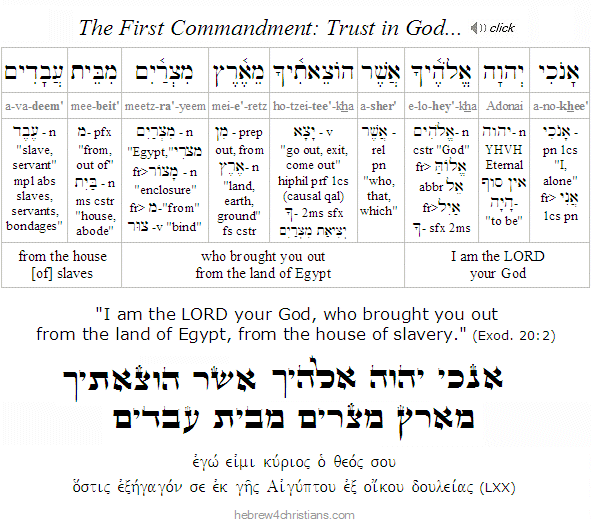|
THE GREAT EXODUS OF ISRAEL from Egypt is the central parable of the Torah. The bondage of the Israelites to Pharaoh represents humanity's slavery to sin; God's deliverance from bondage is effected by trusting in the blood of the sacrificial lamb of God; the passage from death to life symbolically comes through baptism into the Sea of Reeds; the journey to truth represents the pilgrimage to Sinai, and so on. Indeed, the Passover redemption in Egypt led directly to revelation given at Sinai, and when the LORD God gave the Ten Commandments, he began: "I am the LORD your God, who brought you out of the land of Egypt, out of the house of slavery" (Exod. 20:2). It is noteworthy that God referred to himself using the phrase asher hotzetikha me'eretz mitzrayim ("who brought you out from the land of Egypt") instead of identifying Himself as the Creator of heaven and earth (ūöūæūĢū©ūÉ ūæū©ūĢūÜ ūöūĢūÉ). This is because the purpose of creation is to demonstrate God's redemptive love and to be known as our Savior and Redeemer, just as Yeshua is the "Lamb slain from the foundation of the world" (Rev. 13:8; 1 Pet. 1:18-20; Eph. 1:4; 2 Tim. 1:9). "All things were created by Him (i.e., Yeshua), and for Him" and in Him all things consist (ŽāŽģ╬Į╬ĄŽāŽä╬Ę╬║╬Ą╬Į, lit. "stick together") (Col. 1:16-17). The creation (ūæų╝ų░ū©ų┤ūÖūÉųĖūö) therefore begins and ends with the redemptive love of God as manifested in the Person of Yeshua our Savior, the great Lamb of God... He is the Center of Creation ŌĆō the Aleph and Tav ŌĆō the Beginning and the End (Isa. 44:6; Rev. 1:17). All that exists is and was created for the Messiah: "For from him and through him and to him are all things. To him be glory forever. Amen" (Rom. 11:36).
In this connection note that the Hebrew word "mitzvah" (ū×ų┤ū”ūĢųĖūö) usually translated as "commandment," is really about connection to God (i.e., the root ū”ūĢūö means to "bind" or "unite"). When God spoke to the people of Israel, each one felt personally spoken to by God, and therefore it says in the singular, 'I am the LORD your God.'" Indeed the very First Commandment is to accept the reality of our personal deliverance by the LORD: "I am the LORD your God who brought you (singular) out of the land of Egypt, out of the house of slavery" (Exod. 20:2). In fact, the Hebrew text of the Torah reveals that God used the second person singular (not plural) for all the verbs throughout the Ten Commandments: "you (singular) shall have no other gods beside me"; "you (singular) shall not take the Name of the LORD your God in vain," and so on. The very first commandment, however, is the starting point and basis for all that follows. Until you are personally willing to accept the LORD as your God and to connect with Him as your own Deliverer and most worthy King, the rest of the commandments are not likely to be heeded...
Hebrew Lesson
Exodus 20:2 reading (click):

<< Return
|



